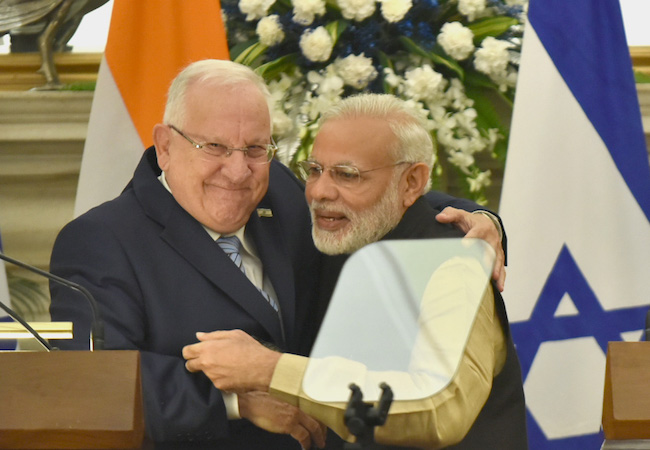Modi’s strategic embrace of Netanyahu doesn’t augur well for the Muslim Middle East

By Nisar Ahmed Khan
In a much hyped visit, Israeli Prime Minister Netanyahu landed in India for a 5 day official visit in January 14, 2018 with a large entourage of professionals and businessmen. The two countries agreed to enhance and deepen bilateral cooperation in innovation, business and trade, space, homeland security and cyber, higher education and research, science and technology, tourism and culture. However, strategic complexities emanating from divergent interests of Israel and Muslim countries in the region make establishment of congenial relations with all these states, if not impossible, a difficult affair. Thus, in this context India’s open and strategic embrace of Israel will affect its ties with Muslim states within and beyond Middle East for a variety of reasons.
Since the establishment of diplomatic relations between India and Israel in 1992, India has seemingly struggled to maintain a difficult balance between Israel and Arab or the Muslim Middle East. For the past 25 years, India has generally conducted its Israel policy with little fanfare and with careful attention to the sensitivities of Palestinians and their international backers. But with right-wing Modi and Netanyahu in power in India and Israel respectively, an apparent shift can be witnessed in India’s Israel policy. This shift has been indicated by the growing bonhomie between India and Israel. Last year in July Modi became the first Indian Prime Minister to visit Israel in 25 years. But India’s ties with Israel come at a huge cost of alienating and distancing other major powers in the region, some being major partners.
Iran is one of the major Muslim countries in the region having strategic rewards for India. Iran hosts Chahbahar port, built with the cooperation and financial assistance of India. Through this port India wants to connect with the energy rich Central Asia via Afghanistan. Iran’s unique geo-strategic location is India’s most logical conduit for projecting power into Central Asia and land-locked Afghanistan. India is eager to expand its power and influence over the smaller states in its near abroad. Given the mutual enmity of Israel and Iran, any move Modi makes in a bid to expand ties with Israel will ultimately disillusion Iran leading it to further cementing its ties with Pakistan, to the chagrin of India.
Indeed, Iran is clearly wary of Indo-Israel defence cooperation. Iran will never be happy to see Indian defence and security cooperation resulting in the strength of its arch nemesis .i.e. Israel. In addition, India’s strategic partnership with the US along with Israel renders it a less reliable partner for Iran owing to the ongoing undeclared war between Iran and US-Israel nexus. The induction of India in this nexus has long been in the making but now India has no qualms about publicizing this.
Notwithstanding their own state-terrorism against Kashmiris and Palestinians, Indo-Israeli security cooperation is also based on a shared perception of dangers from terrorism and its purveyors. Considering the US rhetoric against Iran for its alleged sponsoring of terrorism and India’s strategic partnership with the US, India would be compelled to join the US bandwagon against so called Islamic terrorism of Iran thereby further weakening the prospect of balanced ties.
Notwithstanding the conflicts and differences among Muslim countries in the Middle East, Palestine remains the unifying force. The way Muslim countries rejected and denounced Donald Trump’s recognition of Jerusalem as Israel’s capital is a recent example of solidarity in the face of injustice. Modi’s attempts to delink Palestine from Indian approach to Israel is tantamount to accepting Israel’s brutal treatment and colonization of Palestinian against which India’s founding father Ghandi had famously said “Palestine belongs to the Arabs in the same sense that England belongs to the English or France to the French. It is wrong and inhuman to impose the Jews on the Arabs. What is going on in Palestine today cannot be justified by any moral code of conduct….”
It is widely felt that India’s ties with Palestine are symbolic and without substance. India’s recent vote in favour of Israel against the US move to recognize Jerusalem as Israel’s capital is not driven by Ghandi’s vision rather by mundane considerations of securing Muslim votes in India’s internal politics. In a response to All India United Democratic Front (AIUDF) President M Badruddin Ajmal for thanking Sushma Suwaraj on Palestine vote, the audacious external Minister who doesn’t hesitate to defend India’s brutal use of force against Kashmiris shamelessly demanded votes in return.
This realization may lead the backers of Palestine to downgrade their relations with India if a situation so arises that a perceived inaction on part of these Muslim countries in the face of brutal repression of Palestinians and Kashmiris by the Indo-Israel nexus risks their credibility. This is the last thing to be desired by two heavy weights i.e. Saudi Arabia and Iran. Indo-Israel growing bonhomie is a serious concern for any country seeking the leadership of Muslim Middle East and reputation in the Muslim. Thus, India’s strategic ties with Israel will seriously affect its interests in the oil rich Arab world. The cost of such an eventuality is immense for India which heavily dependents on the oil rich Muslim states for energy requirements.
In conclusion, as India seeks to cement its strategic relations with Israel and the US it will be tempted to take sides. It will also come under pressure to take decisions which otherwise it would not have taken. To secure its long-term interests, India will not resist such temptations and pressure, and will be sucked into the rivalries in the region. India has made such mistakes in the past as well such as giving in to the American pressure on the issue of Iran’s nuclear technology.
Nisar Ahmed Khan is a Research Affiliate at Strategic Vision Institute in Islamabad, Pakistan.




